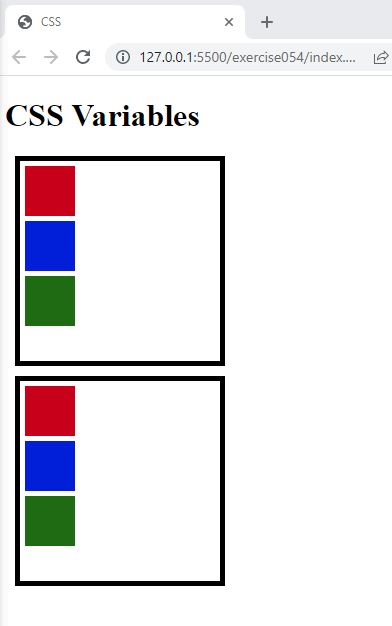CSS Variables
Exercise
- In the "index.html" file, replace the code with the following:
<!DOCTYPE html> <html lang="en"> <head> <meta charset="UTF-8"> <meta http-equiv="X-UA-Compatible" content="IE=edge"> <meta name="viewport" content="width=device-width, initial-scale=1.0"> <title>CSS</title> <link rel="stylesheet" href="./css/styles.css"> </head> <body> <h1>CSS Variables</h1> <div id="container-no-variables"> <div id="first-box"></div> <div id="second-box"></div> <div id="third-box"></div> </div> <div id="container-variables"> <div id="fourth-box"></div> <div id="fifth-box"></div> <div id="sixth-box"></div> </div> </body> </html>
- Save.
- If "Live Server" is not already running, right-click anywhere in the editor and select "Open with Live Server" from the context menu.
- In the "styles.css" file, replace the code with the following:
:root { --bestBlueColor: rgb(15, 15, 218); --bestRedColor: rgb(207, 25, 25); --bestGreenColor: rgb(11, 107, 11); --bigSquareSize: 200px; --smallSquareSize: 50px; --borderSettings: 5px solid black; } #container-no-variables { height: 200px; width: 200px; border: 5px solid black; margin: 10px; } #first-box { height: 50px; width: 50px; margin: 5px; background: rgb(207, 25, 25); } #second-box { height: 50px; width: 50px; margin: 5px; background: rgb(15, 15, 218); } #third-box { height: 50px; width: 50px; margin: 5px; background: rgb(11, 107, 11); } #container-variables { height: var(--bigSquareSize); width: var(--bigSquareSize); border: var(--borderSettings); margin: 10px; } #fourth-box { height: var(--smallSquareSize); width: var(--smallSquareSize); margin: 5px; background: var(--bestRedColor); } #fifth-box { height: var(--smallSquareSize); width: var(--smallSquareSize); margin: 5px; background: var(--bestBlueColor); } #sixth-box { height: var(--smallSquareSize); width: var(--smallSquareSize); margin: 5px; background: var(--bestGreenColor); }
- Save.
- In the browser, you should see the following:

Code Walkthrough and Explanation
:root
In CSS, :root is a pseudo-class selector that targets the root element of a document, which is
typically
the HTML element. It is used to set global CSS variables, also known as CSS custom properties, which can be
accessed
and reused throughout the stylesheet. By using :root, changes made to the variable values will
apply to
all elements that reference them. This makes it a powerful tool for creating consistent design across an entire
website. The :root selector is written as :root { /* styles here */ }.
--bestBlueColor: rgb(15, 15, 218);
background: var(--bestBlueColor);
CSS variables, also known as custom properties, are a feature introduced in CSS3 that allow developers to
declare
variables that can be reused throughout a stylesheet. This allows for more flexibility and efficiency when
making
changes to a website's styling, as variables can be easily updated and applied to multiple elements at
once. CSS
variables are declared using the -- prefix followed by a variable name and a value. They can be
used with
the var() function to reference the value of the variable in other parts of the stylesheet. This
feature
has greatly simplified the process of managing stylesheets and has made it easier to create dynamic, responsive
designs.
Experiment with the Code
- Try changing one of the
cssvariable colors in the root element. - Try adding your own
cssvariable and applying it to an element.
Video and Code References
Questions? Subscribe and ask in the video comments: